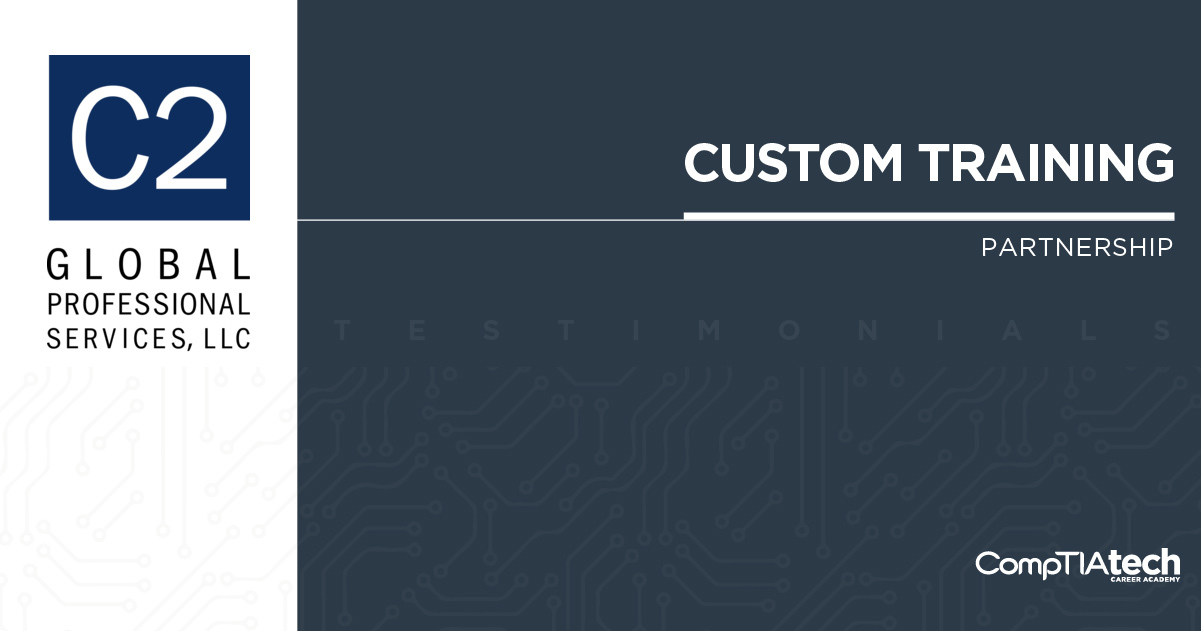 How can our nation’s public workforce system help narrow the tech skills gap in the U.S. job market? By removing barriers to learning new IT skills for displaced and disadvantaged workers. And with innovative program support from CompTIA Tech Career Academy’s custom training.
How can our nation’s public workforce system help narrow the tech skills gap in the U.S. job market? By removing barriers to learning new IT skills for displaced and disadvantaged workers. And with innovative program support from CompTIA Tech Career Academy’s custom training.
In a recent episode of our award-winning podcast, Technologist Talk, Aaron Smith and Ramsey Olivarez, executives at the workforce development agency C2 Global, sat down with host R.C. “Bob” Dirkes to discuss collaborating with CompTIA Tech to re-skill and up-skill workers in Texas and Florida.
Smith, who is C2’s chief operations officer, and Olivarez, who is C2’s chief innovation officer, agree that helping anyone trained to land a job, tech, or otherwise is about removing barriers. Smith kicked off the conversation with insights into the public workforce system.
Here's an edited transcript:
Aaron Smith: The workforce system is a federally funded system. If you listen to the State of the Union for instance and hear about job training programs, that's essentially us.
Federal money gets pushed down to the local levels to operate, not only [training] centers but provide scholarships for training to help individuals get off welfare benefits and food stamps to move them and let them progress with folks that were affected by trade or just big shifts in the labor market. Job training funds help move those folks into new more in-demand [industries].
And that's where CompTIA plugged in for us.
Ramsey Olivarez: On a daily basis, we manage over 100,000 job seekers, 20,000 employers, and we work with about 40,000 job postings every single day as opposed to a job board that is spidering a job from someone's website.
So, if we have a job seeker come in, with only four years’ experience when the job requires five, we can easily call the employer with the relationship we have and say, “Can you work with us and see if you can accept this person?”
If they don't have enough work experience, we'll help them out with that. If they need help with their resume, we'll help them out with that. If they have issues with work clothing, we can help them out with that." So, we remove all the barriers that they have to getting back to work.
Aaron: The job market, in general, is moving quickly. Skills become obsolete at a remarkable rate these days and the valuable function that we provide in the community is that we're a facilitator.
So, essentially a catalyst for when people engage with the system. We can quickly move them in the right direction. Without us bringing the resources in and providing the connections, we would see a lot of folks floundering. They just wouldn't know with whom to connect. And, if we're doing our job right, we're connecting them with the right resources at the right time to move them forward quickly, rather than languishing and trying to figure it out on their own.
Bob Dirkes: I imagine in today's job market, when there are hundreds of thousands of open positions working with technology, your mission puts you on the front lines of narrowing the IT skills gap.
Aaron: Absolutely. We're right in the middle of the skills gap, that we are one of those players who day in and day out, comes in and tries to figure out how to close that gap. And technology plays a big part in that.
We really do strive to innovate and operate in a different way than you'll see traditional [public workforce] systems operate. Just, quite frankly, because a lot of the systems that we move into, they still operate like it's 2004. We try to come in, leverage all the resources that are out there, and make it a much more engaging environment for folks to come in and receive services.
Technologist Talk is a podcast produced for Creating IT Futures, CompTIA’s tech workforce charity, featuring conversations with business leaders, workforce professionals and talent developers about shaping the careers of today’s and tomorrow’s technology workers.

